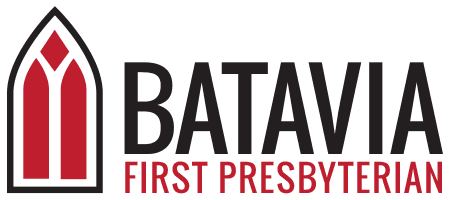Leading others into a fully-devoted relationship with Jesus Christ by loving people, cultivating community, and inspiring hope
Our Core Values
Batavia First Presbyterian Church is a Christian community that is dedicated to transforming lives by being in relationship with God through the way and teachings of Jesus Christ. All are welcome in our community of faith.
What we Believe
God
We belong to God in life and in death. Through the grace of our Lord Jesus Christ, the love of God, and the communion of the Holy Spirit, we trust in the one triune God, whom alone we worship and serve.
God is love. God created the world good and makes everyone equally in God’s image to live in peace.
Jesus
We trust in Jesus Christ, fully human, fully God and strive to follow in his way. Jesus proclaimed the Kingdom of God, preaching good news to the poor and release to the captives, teaching by word and deed and blessing the children, healing the sick and binding up the brokenhearted, eating with outcasts, forgiving sinners and calling all to repent and believe the gospel.
Jesus’ life, stories and presence challenge and transform us.
Holy Spirit
We trust in God the Holy Spirit to set us free to accept ourselves and to love God and neighbor.
The Holy Spirit is God’s loving energy in the world who leads us to pray without ceasing and gives us the power and courage to work with others for justice, freedom, and peace.
(Adapted in part from the Brief Statement of Faith, Constitution of the Presbyterian Church (USA), Book of Confessions)
God’s Grace
God’s grace comes to us not because we have done anything to earn it. God’s love and forgiveness come to us out of the boundless mercy of God’s love.
God loves us where we are and for who we are.
Experiencing God’s grace transforms us. We strive to live a life of gratitude and service in response to the gift of God’s love.
The Bible
We believe that both the New and Old Testaments of the Bible reveal the past, present and future of God’s love, justice, and power in relationship with people and all creation.
We encounter God through scripture. Through these encounters with God, our lives are transformed.
The Bible is a library of people’s experiences of God shaped by their culture and context. Reading and interpreting scripture requires understanding that context through study, prayer, thought and conversation. We strive to look beyond the black and white letters to encounter the living Spirit present in the stories, teachings, and prayers of the Bible.
Baptism
In the baptism of infants, children, and adults, ordinary water becomes an extraordinary vehicle for God’s grace. The waters of baptism are a visible sign of an invisible reality, that even before we know how to respond, God claims us. In baptism we become a part of a spiritual family that stretches across time and space. We are made a part of the Body of Christ.
Communion
One of the ways Jesus provided a practical experience of his vision of the Kingdom of God was through sharing meals with the disciples and with all kinds of different groups in his society. He sat at the table with those considered of high social status and with those who were deemed as outcasts. The experiences of acceptance and sharing at the table became foundational to his followers even after he died and was resurrected.
At the Lord’s Table simple bread and juice become symbols of a heavenly banquet, reminders of God’s lavish provision and sweet grace. While we do not believe the earthly elements turn into the literal body and blood of Jesus, we do believe that in the act of celebrating this meal together, Christ is present in the community of faith. Jesus is the host and all are welcome to the table, no exceptions.
Adopted by Session on October 19, 2016.
